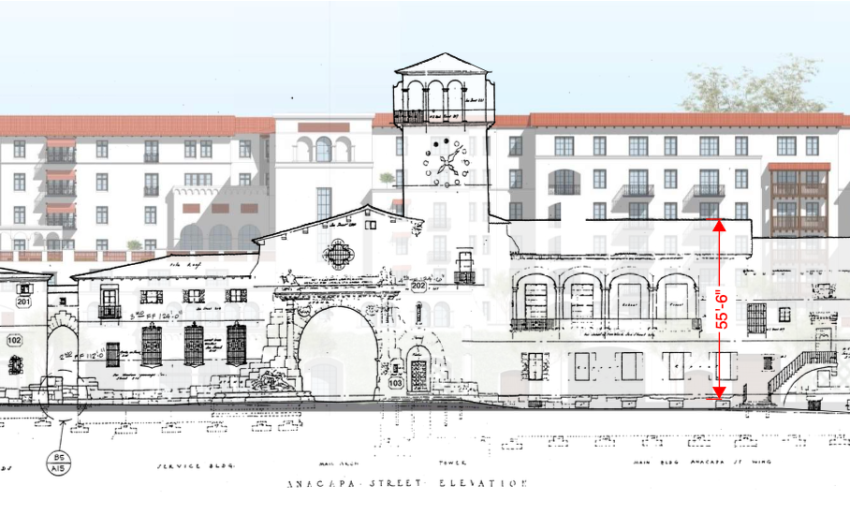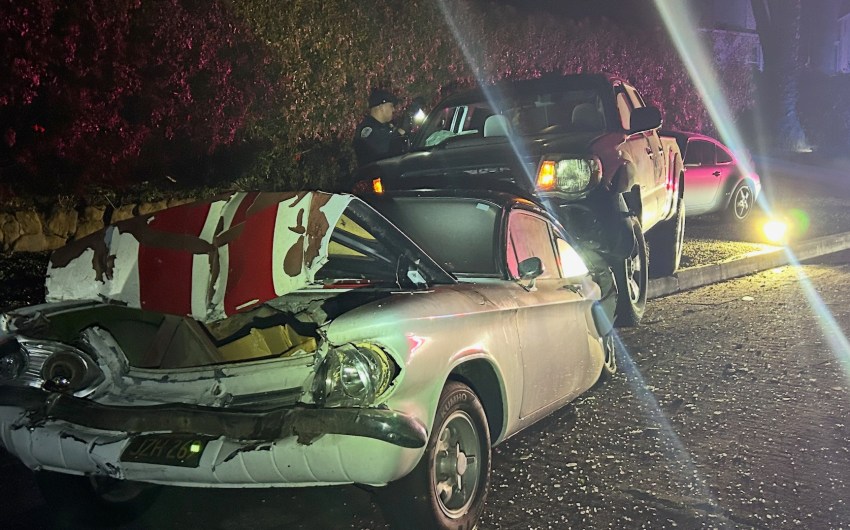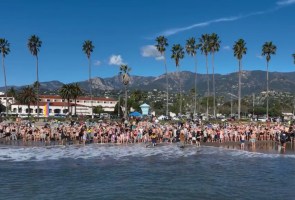[Updated: Fri., Oct. 18, 2024, 9:15 a.m.]
THE QUICK AND THE PLAID: There was an orgy of kissing and making up taking place inside San Diego’s Catamaran Hotel and Spa — famous for its quasi–Polynesian fire swallowers — late last Thursday afternoon. But for all the ardor of their mutual exertions, no actual makeup sex would transpire.
Among the participants were a spectrum of Space Force commanders fresh off the boat from what used to be called Vandenberg Air Force Base. They were chaperoned by an assistant secretary of the Air Force, flown in all the way from headquarters for his consummate skills at making nice.
On the other side of the room was a sizable contingent of California Coastal Commissioners, still seething over their most recent collision with Base brass early this August. That’s when the commissioners got high-hatted, stiff-armed, deep-sixed, and talked-to-the-hand.
Conspicuously absent, naturally, was Elon Musk — Peck’s Bad Boy of the visionary genius set — whose commercial overreach in the guise of national security is what triggered all this bad blood. I say “naturally” because Elon and his minions at the SpaceX rocket ship company have been invited to attend every single Coastal Commission hearing on the subject to date. And there’ve been a lot. Neither Musk nor his underlings have shown up for one.
Musk’s absence matters a great deal. He and the Space Force find themselves joined at the hip in a marriage of great inconvenience up at Vandenberg. I say “inconvenient” because that’s what it is unless you like being woken up at 1:58 in the morning by sonic booms strong enough to shake you out of bed.
That’s the big issue at stake here: sonic booms. And Musk’s reusable rocket ships taking off from Vandenberg. In the months ahead, we can expect a whole lot more of both. At the beginning of this year, Musk and SpaceX were permitted to launch six Falcon 9 rockets into space a year. As of August, the colonels and commanders and Musk had bumped that number to 36. This past Thursday, it “got” bumped yet again to 50. Sometime early next year, the plan is to increase that number to 100.
Each rocket launch deposits 21 Starlink satellites into low-earth orbit. That’s a lot of satellites. That’s a lot of rocket launches. That’s a lot of sonic booms. All these are slated to happen over a swath of Planet Earth — about 125-miles from one end to the next — that happens to run along our coast as far south as Los Angeles.
That’s a lot of people knocked out of bed.

The other big issue is who’s in charge. When the brass speaks, it’s not clear if it’s them or Musk who’s really barking. Even informed observers have a hard time discerning whose tail is wagging which dog. The Coastal Commissioners have the same problem. That’s why they want Musk to show up. That’s precisely why he doesn’t.
Technically, the Space Force is the applicant. They want the Coastal Commission to bestow upon Elon Musk and his rocket ship company, SpaceX, a “Certificate of Consistency” regarding their most recent application to blast up to 50 rockets ships into space within 365 days. As government actions go, it’s a necessary “i” to dot and “t” to cross. But with it or without it, Musk and the Space Force have made clear they are moving forward, full steam ahead.
A long time ago, the Department of Defense determined it’s a lot cheaper to hire a private contractor such as SpaceX to launch satellites crucial to our national defense than it is to run its own space launch operation. For helping out, Musk gets paid a ton of money from the government. Unless Vandenberg were to open up its launch pads to multiple contractors, Musk has also gotten a de-facto monopoly when it comes to SpaceX and his cellular satellite launching capacity.
Legally, the Space Force does not need the Coastal Commission’s blessing. As a federal agency focused on national security matters, Space Force asserts total immunity from the regulatory oversight authority of any state commission. And because Elon Musk and SpaceX is working for the Space Force, all their launches — even the ones that have nothing to do with depositing national defense payloads into space — have been granted that same broad cloak of total immunity.
This has got the Coastal Commission’s noses — both staff and appointed members — violently out of joint. For every launch SpaceX blasts into space for genuine government purposes, it now shoots another 8.7 rockets into space that serve only to feather Elon Musk’s private commercial space launch nest.
Since the number of “approved” launches will be increasing soon, more will be for private satellites rather than public defense ones. The Commissioners are vowing to make Musk come in and apply for all the same permits any private developer would need. They want a full environmental review. Plus Musk will have to mitigate all the negative environmental impacts those sonic booms have on the unsuspecting, adversely effected, land and marine creatures.
Naturally, the commanders and the colonels see it differently. There’s no such thing, they argue, as being “a little bit” of a federal project as there is being a “little bit” pregnant. Without Musk and all his private launches, they maintain, there can be no national security launches. Zero.
If Musk doesn’t qualify as a “made man” under this scenario, he’s certainly protected. And all the way.
Let’s be real. This is not just some deeply felt abstract jurisdictional bone to pick; it’s personal. No, it’s not that the commissioners “hate” Musk. It’s more that they find him and his public antics on the world stage offensive and odious in every way imaginable.
Jumping around on stage with Donald Trump, flashing his belly-button to the world; giving Trump $75 million to get elected president, calling himself “Dark Maga,” and spewing forth on X, his social media platform, all the same sci-fi anti-immigrant paranoid distortions that Trump has spewed at federal emergency rescue efforts in hurricane devastated areas of the country.
Then there’s his long, disturbing history of worker safety violations. According to an investigation conducted by Reuters, SpaceX employees in Redmond, Washington — during the manic rush to get to Mars — experienced a gory track record of mutilations, amputations, impalements, and other terrible accidents on the job. And of course there is his much publicized fight with the Trans community and his fight against anything smacking of “wokeism.”
But the real problem here is they said as much. All these issues were voiced by various and sundry coastal commissioners. And pretty much in these words. By so doing, they left their collective asses blowing in the wind. Musk wasted little time filing a lawsuit against the commissioners, charging them with “naked political discrimination.” He even named Meagan Harmon — a Santa Barbara city councilmember as well as a coastal commissioner — even though Harmon has recused herself from any participation in the deliberations. A daughter of Lompoc, Harmon has relatives who work on the base.
Musk has a point. You can’t refuse to sign on the dotted line about the increase in rocket launches because Musk supports Trump, says crazy stuff, owns X, and is the richest guy on the planet. You can’t refuse because no middle-aged white male anywhere should sport the crop-top look.
You can only refuse based on environmentally relevant grounds. In this case, you can make the case that the acceleration in the cadence — as they put it — in number of additional launches is a case of too much, too fast. By that, I mean that no amount of environmental monitoring — to determine the impact of additional sonic booms on wildlife — can keep pace. By the time any connection is established between sonic booms and critters, Musk will have already maxed out the number of launches.
But that’s where the argument lives. Not whether Musk says crazy stuff.
The commissioners basically painted a bull’s-eye on their own backs and handed Musk an AK-47. And the optics are even worse. Musk and Trump — now bosom buddies — will make this out as yet another example how out-of-control lefties have ruined California. Who will that hurt? Kamala Harris, our former senator.
Had the commissioners confined their rhetoric to the point, they would have argued Musk needed to apply for his permits like any other private developer, not like an exempt federal agency. Admittedly, even that would have been a stretch legally. But they screwed up that argument with all their gratuitous noise, however accurate it might have been. At the end of the day, they voted 6-4 to withhold the consistency determination the colonels and the commanders were seeking.
However, the Space Force colonels and commanders — in stark contrast — were being as sweet as humanly possible, leaving no stone unturned in their quest to turn the other cheek. As about-faces performances go, theirs was both impressive and mystifying.

At the August 8 hearing, Colonel Dorian Hatcher, the Deputy Vice Commander at the base — all but threw the mic in commissioners’ eyes, announcing up front he would not be answering any questions any of the commissioners might have. Nor would any of his staff. Things got very tense after that.
One commissioner took offense at what clearly was intended as an offense. “I’m beyond pissed and everyone in this room should be pissed too,” she said. Another commissioner added, “The Space Force comes here today and intentionally disrespects us. That’s OK. I disrespect you.”
I don’t know if Colonel Hatcher attended this past week’s meeting, but he sure didn’t speak. Instead, the brass smothered the commissioners in nice, taking any and all questions no matter how many times it had already been asked and answered. Vowing to cooperate and keep talking no matter what the commissioners did and how many times they vowed to make Musk apply for the permits a private citizen would have to obtain.
More substantially, the brass had agreed — the week prior — to seven environmental conditions initially proposed by the commission staff. These will require the Space Force to monitor the impact of sonic booms on potentially vulnerable and fragile critters. To the extent problems are identified, the brass vowed to pursue modifications — angle of missile trajectory, maybe, or wait for better meteorological conditions — to mitigate the impacts. And the area to be monitored is pretty huge. Not quite the size of Delaware, but big.
In the August hearing, the brass announced it would agree to only three of the seven conditions, and they were by far the easiest. The other four, the brass said, were off the table and beyond the pale of consideration. It wasn’t so much “talk to the hand” as it was “talk to the fist.”
As concessions go, that’s undeniably huge.
But it also may be totally irrelevant.
Both, probably, are true.
How so? SpaceX is moving so fast to accelerate its rate of rocket launches — from 6 to 36 to 50 to 100 — that by the time its operating at full bore, none of the monitoring schemes designed to measure impact of the sonic booms will have yielded enough data to tell us anything definitely yet.
One reason the commissioners so want Musk — or any representative at the table — because it seems it is the private launches that are driving this dramatic increase. What Musk wants — world domination of the communications satellite launch market — is infinitely greater than what the commanders and the colonels need when it comes to national security launches.
In addition to accepting the new monitoring conditions, the Commanders vowed to work cooperatively with the Coastal Commission and all the federal regulatory agencies charged with protecting endangered and threatened species. The door is now wide open. In August, it was more “Don’t let it hit you on the way out.”
For their part, the commissioners outdid themselves, heaping mounds of appreciation on the brass for the new and improved collaborative approach they were displaying. In reply, the commanders expressly appreciated how much the commissioners appreciated them. It was like that. I was almost moved to yell, “Get a room.” We were in a hotel, after all.
But there would be no need. There would be no make-up sex. We weren’t there yet. Not even close. The commissioners weren’t comfortable that Musk wasn’t present. But much more, they worried that the base commanders’ new, warm, and fuzzy glow would disappear in a nano-second should Donald Trump be elected on November 5. They said as much. Explicitly. Repeatedly. They were getting ready to “go to the mattresses,” not lie down on one.
In the meantime, don’t bother knocking if Elon Musk’s rockets are rocking.
Premier Events
Wed, Dec 31
9:00 PM
Santa barbara
NEW YEAR’S Wildcat Lounge
Fri, Dec 26
7:00 AM
Solvang
Solvang Julefest
Sat, Dec 27
7:00 PM
Santa Barbara
Schnack ‘n Bari Jazz Trio at Roy
Wed, Dec 31
6:15 PM
Santa Barbara
NYE 2026 with SB Comedy Hideaway!
Wed, Dec 31
9:00 PM
Santa barbara
NEW YEAR’S Wildcat Lounge
Wed, Dec 31
10:00 PM
Santa Barbara
In Session Between Us: Vol. I NYE x Alcazar
Wed, Dec 31
10:00 PM
Santa Barbara
NYE: Disco Cowgirls & Midnight Cowboys
Thu, Jan 01
7:00 AM
Solvang
Solvang Julefest
Thu, Jan 01
11:00 AM
Santa Barbara
Santa Barbara Polar Dip 2026
Sat, Jan 03
8:00 PM
Santa Barbara
No Simple Highway- SOhO!
Sun, Jan 04
7:00 AM
Solvang
Solvang Julefest
Wed, Dec 31 9:00 PM
Santa barbara
NEW YEAR’S Wildcat Lounge
Fri, Dec 26 7:00 AM
Solvang
Solvang Julefest
Sat, Dec 27 7:00 PM
Santa Barbara
Schnack ‘n Bari Jazz Trio at Roy
Wed, Dec 31 6:15 PM
Santa Barbara
NYE 2026 with SB Comedy Hideaway!
Wed, Dec 31 9:00 PM
Santa barbara
NEW YEAR’S Wildcat Lounge
Wed, Dec 31 10:00 PM
Santa Barbara
In Session Between Us: Vol. I NYE x Alcazar
Wed, Dec 31 10:00 PM
Santa Barbara
NYE: Disco Cowgirls & Midnight Cowboys
Thu, Jan 01 7:00 AM
Solvang
Solvang Julefest
Thu, Jan 01 11:00 AM
Santa Barbara
Santa Barbara Polar Dip 2026
Sat, Jan 03 8:00 PM
Santa Barbara
No Simple Highway- SOhO!
Sun, Jan 04 7:00 AM
Solvang






















You must be logged in to post a comment.